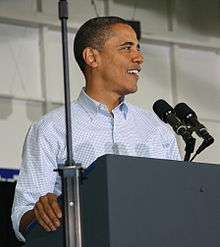Shure SM57
The Shure SM57 is a low-impedance cardioid dynamic microphone made by Shure Incorporated and commonly used in live sound reinforcement and studio recording. It is one of the best-selling microphones in the world. It is used extensively in amplified music and has been used for speeches by every U.S. president since its introduction in 1965.[1] In 2004, honoring its four decades of "solid, dependable performance", it was inducted into the first-ever TEC Awards TECnology Hall of Fame.[1]

Background
The origin of SM57 may be traced to 1937, when Shure engineer Benjamin Bauer developed the first single-element directional microphone, the Unidyne, which had a cardioid pickup pattern.[1] In 1959, another Shure engineer, Ernie Seeler, advanced the art of microphone design significantly with the Unidyne III.[1] Seeler torture-tested the Unidyne III during three years of research and development and thereby, produced the SM series of rugged and reliable Shure microphone capsules.[1] The "SM" stands for Studio Microphone;[2] Seeler was an aficionado of classical music and expected the SM57 to be used for orchestras. Because he "despised" rock music, the TEC Foundation said that it was ironic that the microphone has become "a mainstay of rock music."[1]
Characteristics
The SM57 uses the same capsule as the popular SM58. Like the SM58, the SM57 is fitted with an XLR connector and features a balanced output, which helps to minimize electrical hum and noise pickup. According to Shure, the frequency response extends from 40 Hertz (Hz) to 15 kHz. The SM57 is manufactured in the United States, Mexico, and China.
The Shure A2WS is an accessory windscreen for the SM57 that attenuates wind noise and plosives ("pop" sounds), and protects the microphone capsule.
Use


The SM57 is a popular choice of musicians due to its sturdy construction and ability to work well with instruments that produce high sound pressure levels, such as percussion instruments and electric guitars. The School of Audio Engineering (SAE) recommends the SM57 (along with other makes and models) for four roles in a drum kit: kick drum, snare drum, rack toms, and floor tom.[3] The cardioid pickup pattern of the microphone reduces the pickup of unwanted background sound and the generation of acoustic feedback. SM57s have also been a staple when reinforcing the sound from guitar amplifiers.
Every U.S. president since Lyndon B. Johnson has delivered speeches through an SM57.[1] It became the lectern microphone of the White House Communications Agency in 1965, the year of its introduction, and remains so.[4]
Due to its popularity, the SM57 has been counterfeited frequently by manufacturers in China and Thailand.[5] Shure Distribution UK reports that the SM57, SM58, Beta 57A, and Beta 58A are their microphones that are most commonly counterfeited.[6] In 2006, Shure mounted a campaign against the trading of counterfeit microphones.[7]
Specifications
- Type
- Dynamic
- Frequency response
- 40 to 15,000 Hz
- Polar pattern
- Cardioid
- Sensitivity (at 1,000 Hz open circuit voltage)
- −56.0 dBV/Pa (at 1,000 Hz)
- Impedance
- Rated impedance is 150 ohms (300 ohms actual) for connection to microphone inputs rated low impedance
- Connector
- Three-pin professional audio connector (male XLR type)
- Produced
- 1965–present
See also
References
- TECnology Hall of Fame: 2004 Archived 2013-12-13 at the Wayback Machine
- History of Shure Incorporated Archived 2008-04-28 at the Wayback Machine
- "Microphone Placement: Let's take a look at a standard drum kit". SAE. Retrieved April 6, 2011.
- Charles J. Kouri; Rose L. Shure; Hayward Blake; John Lee (2001). Shure: sound people, products, and values. 1. Shure Inc. p. xiii. ISBN 0-9710738-0-5.
- Home Recording. Joe Shambro, Spotting a Fake Shure Microphone: How to tell if your mic is genuine—or not
- Shure Distribution UK. What is a counterfeit? Archived 2009-03-03 at the Wayback Machine
- Shure Distribution UK. Shure Distribution UK Clamp Down on Counterfeiters Archived 2009-04-25 at the Wayback Machine